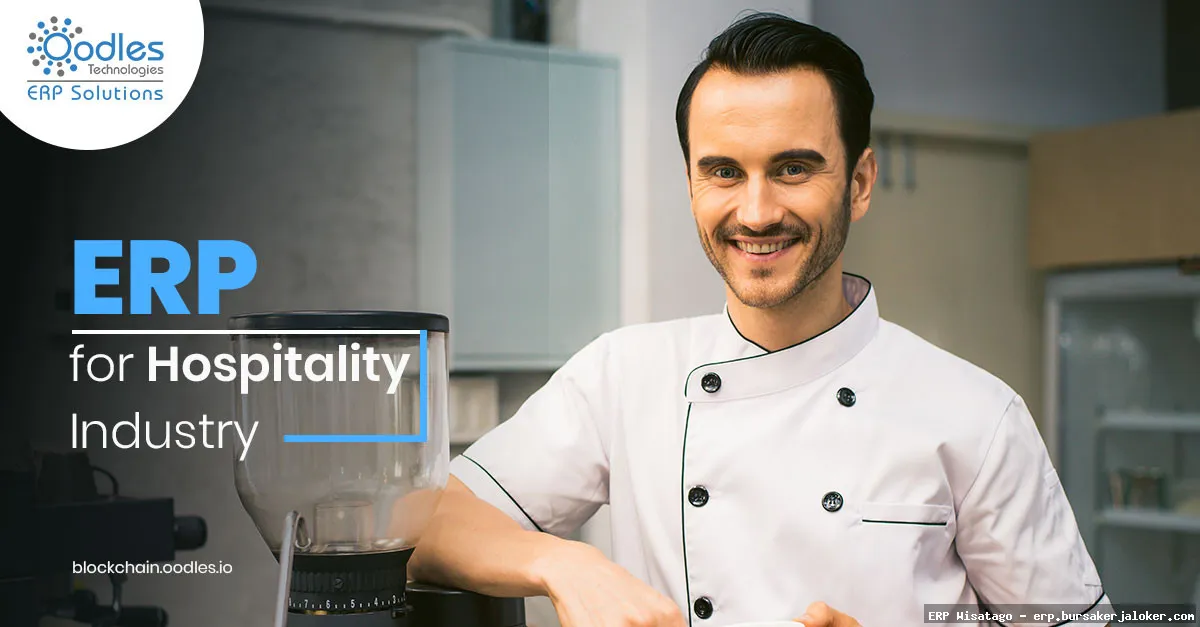The hospitality industry, with its diverse operations ranging from hotels and restaurants to resorts and event management, faces unique challenges in managing resources, ensuring customer satisfaction, and maintaining profitability. Spreadsheets and disparate software solutions might have worked in the past, but as your business grows, they quickly become inadequate, leading to inefficiencies, errors, and missed opportunities. That’s where Enterprise Resource Planning (ERP) systems come into play, offering a centralized and integrated platform to streamline operations and drive growth.
Think of ERP as the central nervous system for your hospitality business. It connects all your departments – from front desk operations and housekeeping to food and beverage management and accounting – allowing them to communicate and share data seamlessly. This integration provides a 360-degree view of your business, enabling better decision-making, improved efficiency, and enhanced customer experiences. It’s about moving from reactive problem-solving to proactive optimization.

This article serves as a complete guide to ERP for the hospitality industry. We’ll delve into the core features of hospitality ERP systems, explore the benefits they offer, address common implementation challenges, and provide practical advice on how to choose the right solution for your specific needs. Whether you’re a small boutique hotel or a large multi-property resort, understanding ERP and its potential is crucial for staying competitive in today’s dynamic hospitality landscape. Let’s embark on this journey of digital transformation together!
What is ERP for the Hospitality Industry?
ERP for the hospitality industry is a suite of integrated software modules designed to manage and automate various business processes specific to hotels, restaurants, resorts, casinos, and other hospitality establishments. Unlike generic ERP systems, hospitality ERP is tailored to address the unique requirements of the industry, such as guest management, reservation handling, food and beverage costing, and point-of-sale (POS) integration. It provides a centralized platform for managing resources, streamlining operations, and improving decision-making across the entire organization.
Key Differences from Generic ERP
While generic ERP systems offer broad functionalities for managing finance, HR, and supply chain, they often lack the industry-specific features required by hospitality businesses. Hospitality ERP, on the other hand, includes modules specifically designed for:
- Property Management System (PMS) Integration: Seamlessly integrates with PMS for managing reservations, guest check-in/check-out, room assignments, and guest profiles.
- Point of Sale (POS) Integration: Connects with POS systems in restaurants, bars, and other outlets for real-time sales tracking, inventory management, and order processing.
- Food and Beverage (F&B) Management: Manages recipes, menus, inventory, and costs associated with food and beverage operations.
- Event Management: Streamlines the planning, execution, and management of events, conferences, and banquets.
- Revenue Management: Optimizes pricing strategies based on demand, occupancy rates, and other factors.
Core Features of Hospitality ERP Systems
A robust hospitality ERP system typically includes a range of modules designed to address the diverse needs of the industry. Here are some of the core features:
Property Management System (PMS)
The PMS is the backbone of hotel operations, managing reservations, guest check-in/check-out, room assignments, guest profiles, and billing. ERP integration enhances PMS functionality by providing a centralized view of guest data and automating processes such as revenue management and housekeeping scheduling.
Point of Sale (POS) Integration
POS integration allows for real-time tracking of sales transactions in restaurants, bars, and other outlets. This data is then integrated with inventory management and accounting modules, providing accurate insights into sales trends, inventory levels, and profitability.
Food and Beverage (F&B) Management
F&B management modules handle recipe management, menu planning, inventory control, and cost analysis. This helps to optimize food and beverage operations, reduce waste, and improve profitability.
Inventory Management
Inventory management tracks the movement of goods from procurement to consumption, ensuring that the right products are available at the right time. This feature is crucial for managing food and beverage supplies, housekeeping supplies, and other essential items.
Customer Relationship Management (CRM)
CRM modules help to build and maintain relationships with guests by tracking their preferences, purchase history, and feedback. This information can be used to personalize guest experiences, improve customer loyalty, and drive repeat business.
Financial Management
Financial management modules handle accounting, budgeting, and financial reporting. This provides a comprehensive view of the financial health of the business and enables better decision-making.
Human Resources (HR) Management
HR management modules manage employee data, payroll, benefits, and performance evaluations. This helps to streamline HR processes, improve employee satisfaction, and ensure compliance with labor laws.
Event Management
Event management modules streamline the planning, execution, and management of events, conferences, and banquets. This includes managing bookings, catering, staffing, and billing.
Revenue Management
Revenue management modules analyze demand, occupancy rates, and other factors to optimize pricing strategies. This helps to maximize revenue and improve profitability.
Benefits of Implementing ERP in Hospitality
Implementing an ERP system in the hospitality industry can bring numerous benefits, including:
Improved Operational Efficiency
By automating and streamlining processes, ERP can significantly improve operational efficiency across all departments. This can lead to reduced costs, faster turnaround times, and improved resource utilization.
Enhanced Guest Experience
With a centralized view of guest data and personalized service offerings, ERP can help to enhance the guest experience. This can lead to increased customer satisfaction, loyalty, and positive reviews.
Better Decision-Making
ERP provides real-time data and analytics, enabling better decision-making at all levels of the organization. This can lead to improved profitability, optimized resource allocation, and proactive problem-solving.

Increased Revenue
By optimizing pricing strategies, improving inventory management, and enhancing the guest experience, ERP can help to increase revenue and improve profitability.
Improved Compliance
ERP can help to ensure compliance with industry regulations and standards, such as data privacy laws and food safety regulations. This can reduce the risk of fines and penalties.
Centralized Data Management
ERP provides a single source of truth for all business data, eliminating data silos and improving data accuracy. This enables better collaboration and communication across departments.
Common Challenges During ERP Implementation
While the benefits of ERP are significant, implementation can be challenging. Here are some common hurdles:
Resistance to Change
Employees may resist adopting a new system, especially if they are accustomed to existing processes. Effective change management is crucial for overcoming this resistance.
Data Migration
Migrating data from legacy systems to the new ERP system can be complex and time-consuming. Data cleansing and validation are essential to ensure data accuracy.
Integration Issues
Integrating the ERP system with existing systems, such as PMS and POS, can be challenging. Proper planning and testing are necessary to ensure seamless integration.
Cost Overruns
ERP implementations can be expensive, and cost overruns are common. Careful budgeting and project management are essential to stay within budget.
Lack of Training
Insufficient training can lead to user errors and inefficient use of the system. Comprehensive training is crucial for ensuring that employees can effectively use the ERP system.
Choosing the Right ERP Solution for Your Hospitality Business
Selecting the right ERP solution is crucial for a successful implementation. Here are some factors to consider:
Identify Your Specific Needs
Before evaluating ERP vendors, clearly define your specific business needs and requirements. Consider the size of your business, the complexity of your operations, and your budget.
Evaluate Different Vendors
Research and evaluate different ERP vendors, comparing their features, pricing, and customer reviews. Look for vendors with experience in the hospitality industry.
Consider Cloud vs. On-Premise Solutions
Decide whether you prefer a cloud-based or on-premise ERP solution. Cloud-based solutions offer greater flexibility and scalability, while on-premise solutions provide more control over data and security.
Check for Scalability
Ensure that the ERP solution can scale to accommodate your future growth. Choose a system that can handle increasing transaction volumes and user loads.
Request a Demo
Request a demo of the ERP system to see how it works and whether it meets your needs. Ask specific questions about features, functionality, and integration capabilities. For more information, you can refer to RMM as an additional resource.
Read Customer Reviews
Read customer reviews to get insights into the vendor’s reputation and the quality of their support. Look for reviews from businesses similar to yours.
Consider the Total Cost of Ownership
Consider the total cost of ownership, including software licenses, implementation costs, training costs, and ongoing maintenance fees. Don’t just focus on the initial purchase price.
Conclusion
ERP systems offer a powerful solution for streamlining operations, enhancing guest experiences, and improving profitability in the hospitality industry. By understanding the core features of hospitality ERP, addressing common implementation challenges, and carefully choosing the right solution, businesses can unlock the full potential of ERP and achieve significant benefits. The journey to digital transformation may seem daunting, but the rewards of increased efficiency, improved decision-making, and enhanced customer satisfaction are well worth the effort. Embrace the future of hospitality with ERP!
Frequently Asked Questions (FAQ) about ERP for hospitality industry
What are the key benefits of implementing an ERP system specifically designed for hotels and the hospitality industry?
Implementing an ERP system tailored for the hospitality industry, particularly for hotels, offers numerous benefits. Primarily, it streamlines operations by integrating various departments like front desk, housekeeping, food and beverage, and finance into a single, unified platform. This integration enhances communication and collaboration, leading to improved efficiency and reduced operational costs. An ERP system provides real-time visibility into key performance indicators (KPIs) such as occupancy rates, revenue per available room (RevPAR), and customer satisfaction scores, enabling data-driven decision-making. Furthermore, it automates repetitive tasks like inventory management, procurement, and financial reporting, freeing up staff to focus on enhancing guest experiences. A well-implemented ERP also improves accuracy, reduces errors, and ensures regulatory compliance. Ultimately, it contributes to increased profitability and enhanced guest satisfaction.
How does an ERP system help manage inventory and procurement more effectively in restaurants and other food service businesses?
An ERP system significantly enhances inventory management and procurement for restaurants and food service businesses. It provides real-time tracking of ingredients, supplies, and finished goods, minimizing waste and spoilage. The system automates the ordering process based on predefined par levels and demand forecasts, ensuring that the right quantities of items are available when needed. Furthermore, it streamlines procurement by automating purchase order generation, vendor selection, and invoice processing. ERP systems also facilitate price comparisons and vendor performance analysis, enabling businesses to negotiate better deals and optimize their supply chain. By centralizing inventory data and automating procurement processes, an ERP system reduces manual errors, minimizes stockouts, and improves overall cost control, leading to increased profitability and operational efficiency in food service establishments.
What are some critical features to look for when choosing an ERP solution for a hospitality company with multiple locations?
Selecting an ERP solution for a hospitality company with multiple locations requires careful consideration of specific features. A crucial feature is centralized data management, allowing for real-time visibility across all locations. The system should offer robust reporting and analytics capabilities, enabling consolidated financial reporting and performance tracking. Scalability is essential to accommodate future growth and expansion. Integration with existing systems like Property Management Systems (PMS), Point of Sale (POS), and Customer Relationship Management (CRM) is also vital. Furthermore, the ERP should support multi-currency and multi-language capabilities for international operations. Look for features such as automated intercompany transactions, centralized procurement, and standardized business processes across all locations. Finally, ensure the ERP vendor offers comprehensive training and support to facilitate successful implementation and ongoing maintenance. These features are critical for optimizing operations, improving efficiency, and maximizing profitability across a multi-location hospitality organization.
